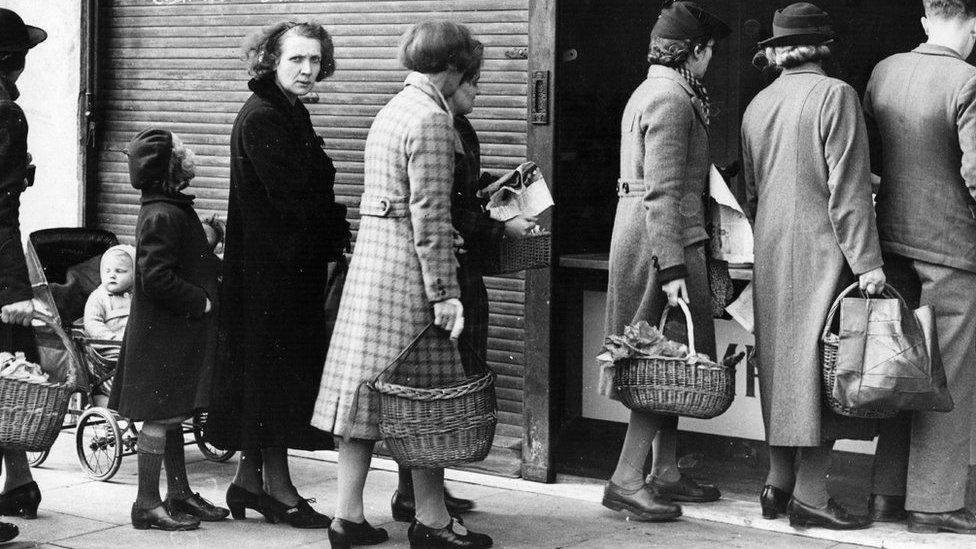Will paying with contactless cards make us less healthy?
- Published
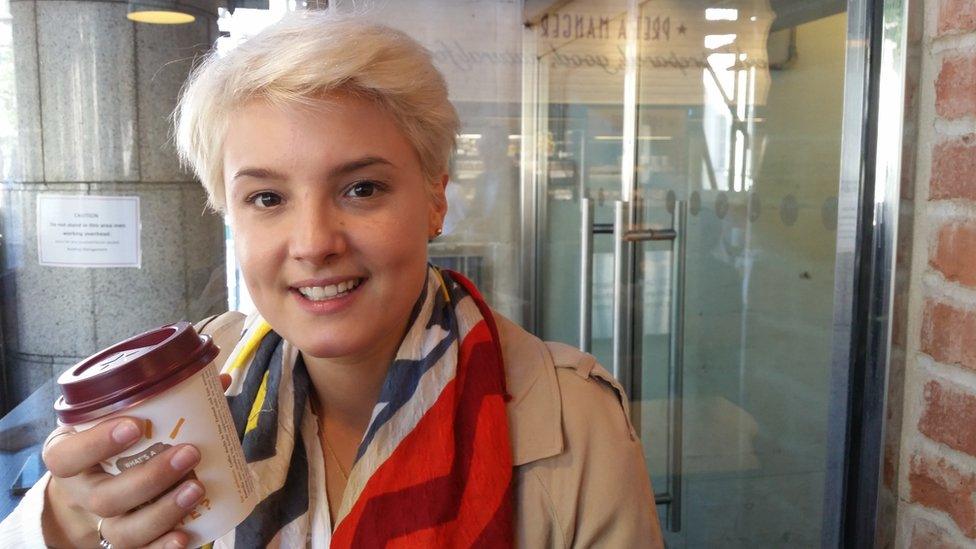
"We're all getting bigger in the office!" says Emma Casbolt. Should we blame the plastic?
This morning I'm making some unscientific observations. I'm standing at the tills at my local coffee shop, the one where I sometimes (often) succumb to the temptation of a pastry. And I'm watching people pay.
Most of them are using their cards, a few use their phones and a few still count out coins.
As we're always hearing, we are all using cash less and cards, especially contactless payments, more.
So much so that in five years' time debit cards will have overtaken, external cash as the most common method of payment. And it may be changing not just how we buy, but what we buy.
First I chat to events manager Emma Casbolt, 24, who has just polished off an almond croissant and is draining her coffee cup. She thinks this could prove a problem.
"It's way too easy. It doesn't feel like it's money. It feels fake."
She says paying with cards can make it harder to resist temptation.
"It's so accessible, I spend more on the little things.... I offer to buy things for other people.
"We're all getting bigger in the office!"
There's intriguing evidence that supports Emma's hunch. By making it easier to pay, plastic cards do make it harder to resist the little snacks, the unhealthy purchases and treats, that with a pocket full of coins we might be able to refuse, say researchers.
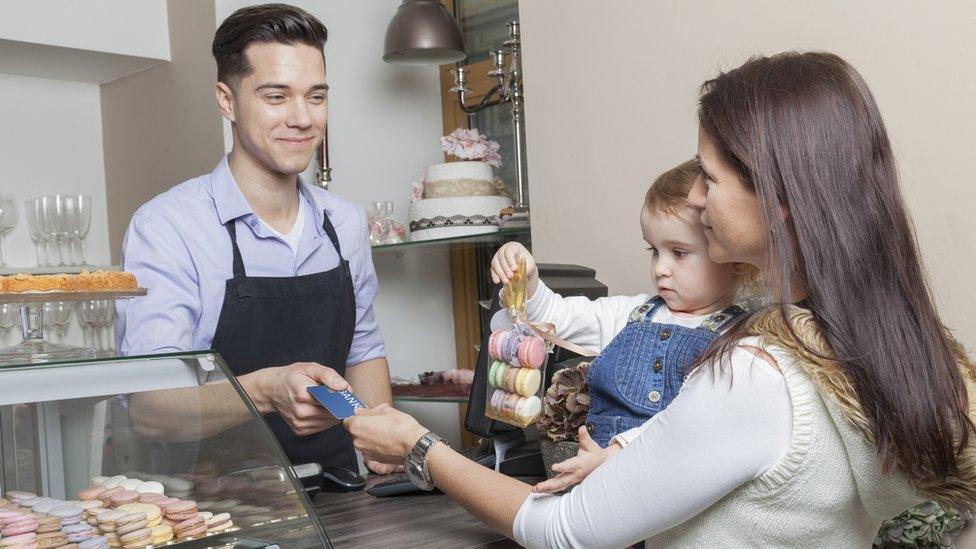
Paying with a card can ease the pain of paying
Over the last few decades psychologists have found that paying with cash carries an additional pain, whereas the distancing effect of using a card makes spending easier.
Therefore, they say, we are much more likely to splash the plastic than splash the cash.
But research in 2010: How Credit Card Payments Increase Unhealthy Food Purchases: Visceral Regulation of Vices, external goes a step further, showing that paying with plastic makes us more likely to buy unhealthy food.
The researchers analysed the shopping behaviour of 1,000 American families over six months and found their shopping baskets contained a larger proportion of food items rated as "impulsive and unhealthy" when they used cards to pay.
Their theory was that if you are buying a "virtue product" such as fat-free yoghurt, you can explain away any pain you feel at handing over cash. But if you're paying for a "vice product" like cookies, cakes and pies you are acting on a visceral impulse.
The pain of paying can't be justified so easily. So if you're using a plastic card you can mitigate that pain and you're more likely to go ahead and buy.
Interestingly the researchers also found that "tightwads" who are generally reluctant to spend, were more susceptible to the soothing influence of paying with a card, compared to the "spendthrifts" who part with money more easily in the first place.
Given that most of us, when faced with a doughnut, can experience difficulties with "impulse control" this information could prove useful.
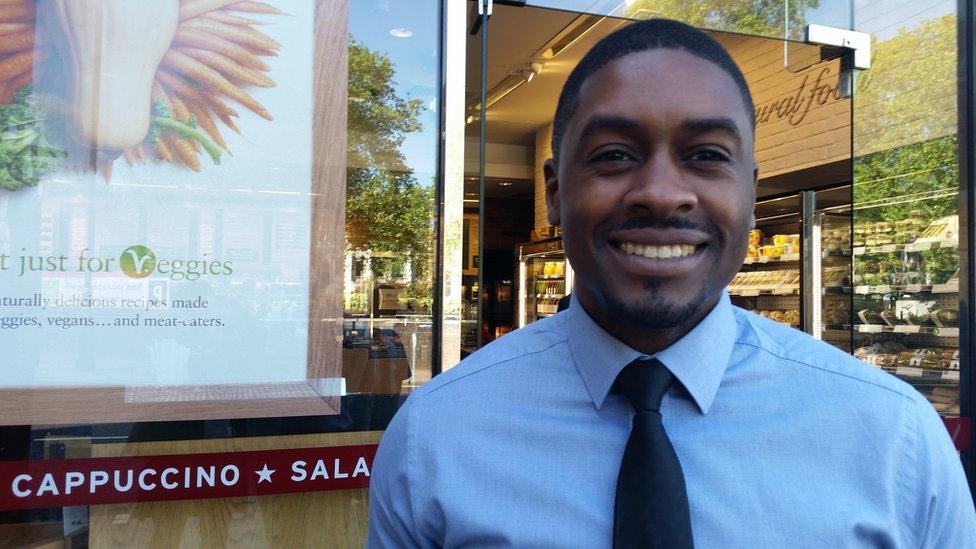
When he ran a test, Jean-Robert Kamdoum found paying with contactless made him spend more than usual
Steve Peters is author of The Chimp Paradox, a book examining how our rational, long-term decision-making tries to constrain our desire for immediate gratification.
"One of the systems works very impulsively. By nature the contactless payments favours that system. Whereas the cash in your hand makes you act rationally. It favours the system where you're going to think through the consequences of your action."
So could contactless payments - waving a card or a phone briefly over a reader - further weaken our ability to resist the treats?
Claudia Hammond, author of a new book, Mind over Money, and a presenter on BBC radio, says it's too soon to judge the impact of contactless per se, but she believes it's likely to follow a similar pattern.
"I think there is something that feels even more unreal about contactless payment," she says.
"No-one has measured that yet, but I would say it will divorce the pain of paying from the actual transaction again."
So it could well make people spend more, not just on food but on all sorts of things.
"People don't remember how much they paid when it's on a card. So I think you'll be even less likely to know how much [something] cost. Often I have no idea two minutes later [how much I've spent] because I was thinking about something else when I put the card on there."
Luckily she thinks this influence on our shopping habits won't last.
"I think in the end we'll get used to it... If we don't get used to it, we'll all be broke."
In the meantime she suggests it's often worth just picturing cash in your hand, even when you are paying with a card and asking yourself, do I still want to buy this?
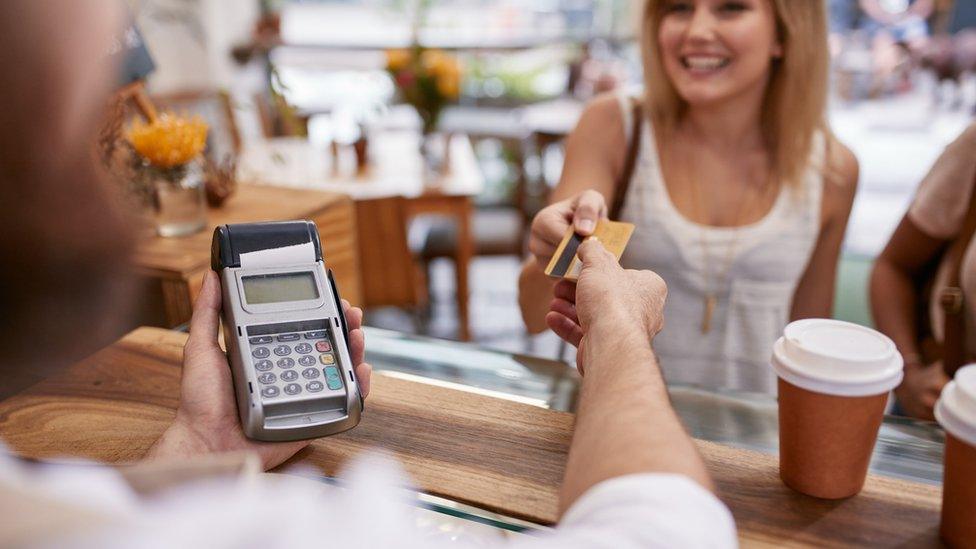
Imagine it's a £10 note...
Another of today's coffee shop customers is Jean-Robert Kamdoum, 36, a business development manager from the office next door. He's just bought a cheese and bacon pastry to take away.
Coincidentally he did his own impromptu experiment a few months ago when his bank replaced his lost debit card with one with contactless technology.
"I did a test. Two weeks cash, two weeks card and contactless," he says.
He found he did spend "a little bit more on contactless". Over the month as a whole he thinks he spent £50 more than he would have if he'd stuck to cash alone.
So did he opt for a cash-only system? "Nah, I just don't like stuff in my pockets."
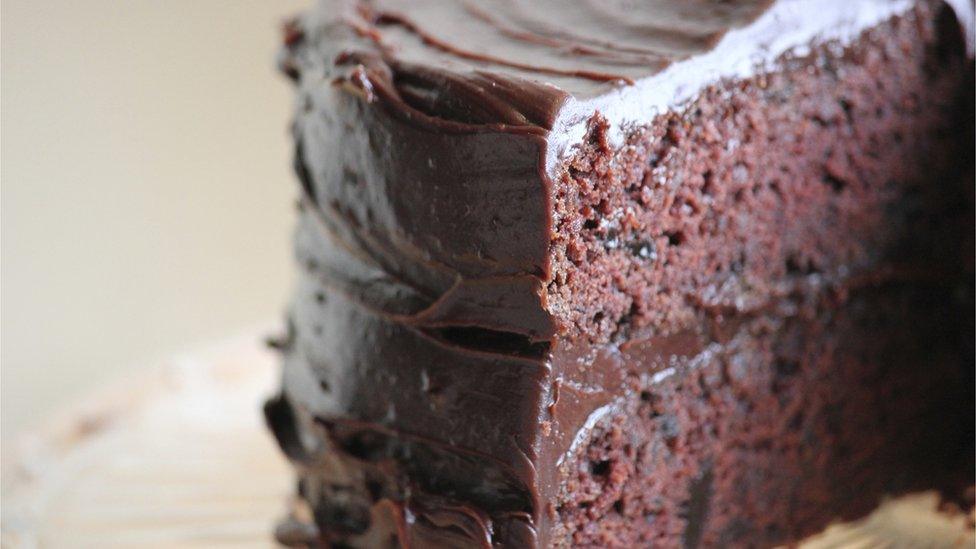
Can't resist?
And in any case switching back to cash may not have done him much good.
Another piece of research from 2011: Chocolate Cake Please!: Why Do We Indulge More When It Feels More Expensive?, external appears to show that the prospect of paying with cash made consumers more likely to indulge in high-calorie food. The researchers found the prospect of a highly luxurious chocolate cake helped people overcome the pain of payment altogether.
Claudia Hammond says that can also be explained.
"In our minds we have all these different accounts for different bits of money. Some money in our minds is for everyday expenses, some money is for transport, some money is for everyday food and bills. And then some money is for treats.
"If in your mind you can see something as a treat you will pay much more for it. You can excuse it, you can justify the money, and maybe you can also justify the unhealthiness as well."
- Published21 May 2016

- Published1 April 2016
